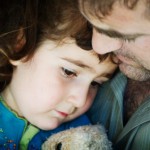What to do
 Don’t panic or over-react. Sometimes it is fear of this that keeps children from telling. Your child is depending upon your stability.
Don’t panic or over-react. Sometimes it is fear of this that keeps children from telling. Your child is depending upon your stability.- Let your child see that you are not happy that the person hurt him or her, but don’t make threats to beat up or kill that person. Tell your child what you are going to do to protect him or her from further abuse, and to protect other children but don’t make promises. Report it to CYF or the police.
- Don’t underestimate the effects this abuse has had on you. If you are an abuse survivor, this can reawaken old or unresolved issues from your own abuse. It is also very important you seek professional counselling to get through these difficult times.
- Don’t pressure your child to talk about the abuse, or to avoid talking about it. Let the child talk at his/her own pace. This is important for emotional and legal reasons as it can contaminate evidence. The child does not need any additional pressure at this time. Silencing the child will be giving the child the message that s/he should not talk; a message s/he repeatedly had from the abuser. Leave it to the experts to gather evidence. (Sometimes the perpetrator’s lawyers will make it seem as if the child’s parent put the words into the child’s mouth, and therefore sullied the truth of the testimony). Don’t be afraid to talk to your child and ask what they need. Resist the desire to continue to quiz or push for information.
- Do not confront the offender, leave this to the police. Their healing may not include a face-to-face encounter. This is no small emotional event though, and professional consultation is strongly recommended.
- Don’t blame your child. It is never the child’s fault, although the perpetrator will work to make the child believe that.
- Don’t lose touch with your own personal support system. You may need help in getting through this difficult time.
- Remember that while the abuse may have dramatically changed all your lives, with appropriate help you can reduce long-term effects.